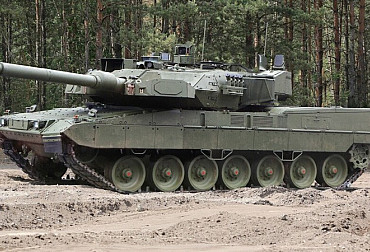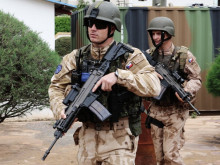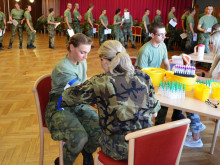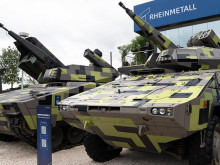Defence Committee discusses the state budget and the situation in Ukraine
Yesterday's 5th session of the Defence Committee had several key items on the agenda for discussion and approval. In addition to getting acquainted with the nominee of Defence Minister Jana Černochová for the newly established post of Cyber Defence Inspector, Mgr. Jan Vacek, the Committee took a detailed look at and discussed the state budget in Chapter 307 of the Ministry of Defence. It also approved the participation of our troops in exercises at home and abroad. In a reserved mode, the Committee discussed the current situation in Ukraine and information from the morning meeting of the National Security Council.
In addition to Defence Minister Jana Černochová, the committee meeting was also attended by the Director of Military Intelligence, Maj. Gen. Jan Beroun, Chief of the General Staff of the Czech Armed Forces Gen. Aleš Opata, Director of the NSA Maj. Gen. Jiří Lang, Deputy for the Management of the Armaments and Acquisitions Section of the MoD Lubor Koudelka, Deputy Ministers of Defence Daniel Blažkovec and František Šulc, State Secretary of the MoD Petr Vančura, Deputy for the Management of the Economic Section of the MoD Blanka Cupáková and other guests.
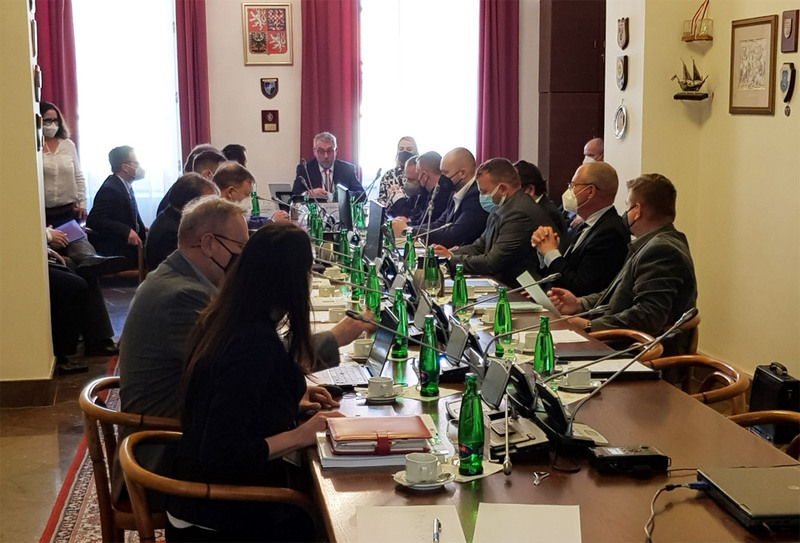 Picture: Yesterday's 5th session of the Defence Committee had several key items on the agenda for discussion and approval | Jan Zilvar / CZ Defence
Picture: Yesterday's 5th session of the Defence Committee had several key items on the agenda for discussion and approval | Jan Zilvar / CZ Defence
At the beginning of the meeting, Minister Černochová introduced to the Committee members the candidate for the new position of the Cyber Defence Inspector, Mgr. Jan Vacek. This is a new control mechanism based on the amendment to the Military Intelligence Act adopted last year. Once appointed, the Cyber Defence Inspector will formally become a member of Military Intelligence, but will report directly to the Minister of Defence in the performance of his duties. At the Committee on Cyber Defence, it was said that cyberspace is a regular theatre of war and adequate measures need to be taken. One of the main tasks of the new inspector will be to examine the correctness of procedures and activities related to the handling of data and information obtained in the framework of ensuring national defence in cyberspace. The inspector will also cooperate with operators and service providers, where the Military Intelligence Department places the so-called detection tools, and handle their possible complaints. Jan Vacek meets all the formal requirements for this position and holds a valid certificate of a natural person of the appropriate classification.
The Committee also discussed the current situation in Ukraine in closed session. After more than an hour, it then adjourned the meeting until the next meeting, with the understanding that it would continue to consider developments at the next meeting. The Committee also discussed the participation of the Armed Forces of the Czech Republic in military exercises outside the Czech Republic and the participation of the armed forces of other states in military exercises on the territory of the Czech Republic in 2022 and recommended them to the Chamber of Deputies for approval.
An important point of the committee meeting was the discussion of the 2022 state budget in the chapter of the Ministry of Defence. The budget was presented in detail by Deputy Minister Blanka Cupáková, where the main parameters are to maintain the growth of defence spending this year at CZK 88.1 billion (1.33% of GDP). In 2023, the forecast is CZK 100 billion (1.42% of GDP), in 2024 the forecast is CZK 109.5 billion (1.49% of GDP) and in 2025 the target defence spending is CZK 150 billion (2% of GDP). Following the debate, the Committee recommended to the Chamber of Deputies, by a vote of 8 to 6, that the proposed budget be approved.
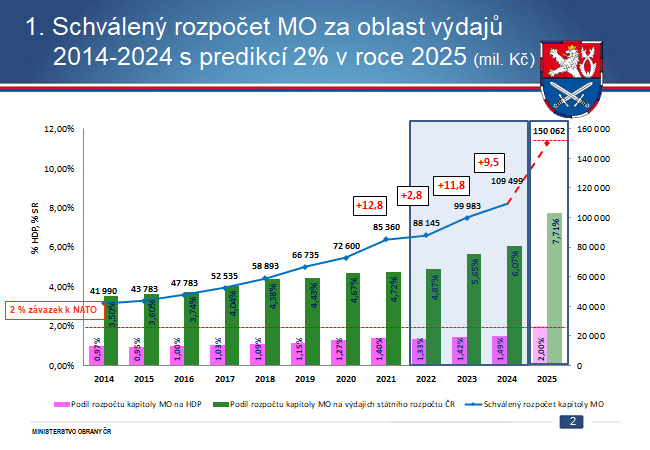
Picture: Approved MoD spending budget 2014-2024 with 2 % forecast in 2025 | Ministry of Defence of the Czech Republic
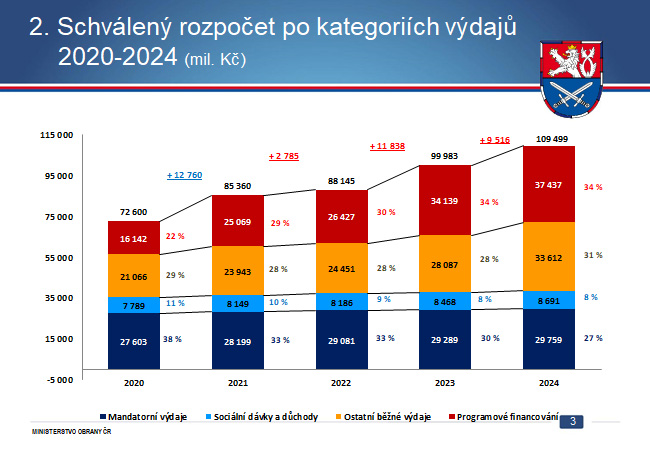
Picture: Approved budget by expenditure category 2020-2024 | Ministry of Defence of the Czech Republic
In the context of the Defence Committee's deliberations, we put the following three questions to all members of the Committee:
1. Do you consider the plan for military exercises on our territory and outside the Czech Republic to be sufficient? Can it cover the current potential threats?
2. In your opinion, are the state budget expenditures on defence for this year at a level that will maintain the approved pace of modernisation of the Czech Armed Forces? Will it be necessary to adjust the multiannual budget outlook for the defence ministry?
3. In your opinion, should the Concept for the Construction of the Armed Forces until 2030 be updated?
Below are the responses:
Lubomír Metnar (ANO), Chairman of the Committee
1. The exercise plan is under the responsibility of the Chief of the General Staff, whom I trust, and I consider it sufficient, even in view of potential threats.
2. If the strategic documents are indeed updated, the multiannual outlook will have to be adjusted. In the budget presented, the medium-term outlook 2023-2024 is unchanged from the one we have approved. This year, CZK 5.4 billion has been cut, of which CZK 4.83 billion has been cut under the pretext of the non-implementation of the IFV project, but CZK 0.52 billion has also been cut due to the non-implementation of salary adjustments. We originally proposed a CZK 1 400 salary increase, which I insist on, not least because of the current inflation. I do not agree with the lower rate of increase in view of the NATO commitment. Above all, defence spending must be continuous and growth must be gradual.
3. I do not consider it a good way to start work in the Ministry of Defence by changing the recently approved strategic documents, which have been widely discussed by the expert public and across the political spectrum, but it is necessary to reflect possible NATO requirements.
Josef Flek (STAN), Vice-Chairman of the Committee
1. I would prefer more frequent military exercises on the territory of the Czech Republic and also within the framework of joint exercises of NATO armies. Practice makes perfect. Moreover, war is much closer than it used to be. We can only face the current potential threats in a collective security system.
2. Regarding the modernisation of the Czech Army, budgets have been insufficient for several years. Moreover, we are in an economic crisis, which means that every budget chapter must be cut. Everyone had to sacrifice a piece of their share (budget chapters), we cannot ignore the rising inflation and other negative economic phenomena. We had to postpone the IFV for this year, but fortunately the Ministry managed to valorise the soldiers' salaries by CZK 700. It is the art of the possible. No one will ever be completely satisfied. In the future we will also have to modernise the Air Force, but we will evaluate its parameters according to the economic situation and the needs of the Czech Air Force.
3. At the moment, I do not see any reason for this, but we must leave a back door for possible crisis situations and possibly change the Concept accordingly.
Jan Hofmann (ODS), Vice-Chairman of the Committee
1. The exercise plan corresponds to the needs of the Army, so I consider it sufficient. The best training for our soldiers is foreign missions where soldiers actually come into contact with the enemy. It is also thanks to foreign missions that we have experienced soldiers.
2. The defence budget is the same as that proposed by the last Government. Only projects that cannot be implemented this year have been removed. The projects need to be prepared so that they can be included in the budget in a given year, i.e., for example, IFV should appear in the next budget. We have only taken over the budget of the previous government, as we did not have time to completely rework it. Indeed, our budget will only be for 2023.
3. Yes, there is a consensus on this.
Pavel Růžička (ANO), Vice-Chairman of the Committee
1. I have no reason to question this document. I think it contains everything that is needed.
2. In the chapter book of the Ministry of Defence, which we received together with the draft state budget, it is stated that the assumed share of the MoD chapter in the forecast GDP for the draft for 2022 is 1.33%, in the first year of the medium-term outlook this share is assumed to be 1.42% and in 2024 1.49%. Thus, with the parameters of the present proposal set in this way, the Czech Republic's political commitment to NATO, i.e. to achieve a defence expenditure share of 2% of GDP, is not yet approached. It is sad that the current Government is taking EUR 5.4 billion from the Czech Armed Forces. Even given the current security situation in the world.
3. I wonder what the new Minister will come up with and what her idea will be. I might be very quick to say what is going to happen with the IFV. That is a fundamental question for me.
Stanislav Blaha (ODS), Member of the Committee
1. I think that the number of planned military exercises of our army is sufficient. I consider our army to be a professional military unit and, even in the international arena, a very active element of common security, not only in Europe. As long as these exercises are planned in advance and stick to the thematic framework for which they are intended, it is the quality rather than the quantity that is important to me. Luck always favours the prepared.
Foreign exercises of Czech soldiers are absolutely essential for the functioning of the Czech Armed Forces. We are part of NATO, and therefore it is important not only to sign treaties and promises with our partners, but also to actively prepare our armies together for military threats. Unfortunately, as we see in Eastern Europe, this is an increasingly topical issue and we must be able to respond to them in a well-coordinated manner.
2. Yes, the Ministry of Defence will manage with a budget CZK 5.4 billion lower than planned in the original state budget scheme for this year, but this is due to unrealised contracts. Crucially, the ministry's expenditure is almost CZK 13 billion higher than the state budget from last year. These funds can ensure the purchase of modern technologies and investment in research and development.
The multiannual outlook for the defence budget must be formulated in such a way that it is clear what it will look like in five years' time, rather than changing it year by year. This completely limits the work of strategic planning. Here, we should, above all, create a legal environment that will make it easier to work with expenditure and the army budget in general. For example, a statutory fixed amount. We said that at the election and we are saying it now. Even the Minister in the Ministry of Defence is talking about it.
3. It should, it is a necessary step to deliver what we have committed to the electorate to do. We made it clear in the programme statement that this is a priority. We need to review some of the current needs of the military and also update the concept in line with economic realities. Without that, we will not be able to deliver on the current concept. As well as the top priority of spending 2% of GDP on defence, which is the most important for us.
Karel Krejza (ODS), Member of the Committee
1. The current threats are updated every hour, as we can see. I assume that whoever is planning the exercise is aware of how quickly they can move troops from the exercise site to a possible real battlefield, ideally within hours.
2. The current budget has been constructed with the size of the deficit in mind, and that is before the escalation of tensions in Ukraine. Despite losing this year's IFV funding, the Minister is keeping modernisation on an appropriate pace, in line with the budget, in line with our NATO allied commitments. Following on from that, I think it is a good idea to set up a defence fund that will be used only for specific projects, and its main advantage will be flexibility. Whether it will be necessary to adjust the outlook depends, among other things, on the situation in Ukraine.
3. Yes, it will be necessary, given the change in the international security situation, the retreat from Afghanistan, the situation in Mali and, above all, the conflict in Ukraine. The latter is so fundamental that I expect a proposal from the Army leadership to update the Concept of build-up of the Czech Army for consideration by the Committee fairly soon.
Michal Ratiborský (ANO), Member of the Committee
1. It is said that it must always be a matter of price x performance, but in this case it is also true that quantity means quality. I will support the maximum possible involvement of our soldiers in exercises at home and abroad. The conflict in Ukraine clearly shows that we are close to a conventional military conflict in Europe as well.
2. The minus 5.4 billion is really a lot, and it is justified by the postponement of the first payment in the IFV project, which is not entirely true. At the same time, thanks to this reduction in spending and rising inflation, the share of defence investment in relation to GDP is falling in real terms, instead of rising as promised before the elections. But much more important from my point of view will be the years to come and here I will be an "optimist" and believe the promises and the government's announcement of a SIGNIFICANT increase until 2024.
3 With the new Minister coming in and especially with the planned replacement of the Chief of General Staff I expect nothing different. Whoever becomes Chief of General Staff will surely want to reflect his/her priorities in the Czech Army.
Radovan Vích (SPD), Member of the Committee
1. There is no better preparation of the Army than military exercises. It is necessary to see their number also in the context of the other main tasks of the Czech Armed Forces. The proposals for individual exercises include other tactical activities, which is part of the current threats and risks in the area of migration, but it is necessary to fulfil the proposals for exercises also in the sense of practising the defence of the territory of our state in the event of an attack on our republic by the armed forces of other states. I see some reserves here.
2. The SPD movement has never voted for cutting the MoD budget, which is currently happening. We are reaping the fruits of the former CSSD and ODS governments and their defence ministers, when continuous modernisation was not carried out in times of economic boom. Since 2004, the budget for the Army has been steadily reduced to a shameful 0.97% of GDP in 2013. While there has been a gradual increase in the budget since then, the current 1.33% of GDP is still not enough. Major modernisation projects have been permanently postponed for various reasons, but at the same time the armaments continue to age technically and lose their reliability. At the same time, in my opinion, it is currently impossible to achieve 2% of GDP by 2025 at this rate.
3. Yes. Some modernisation projects will have to be reassessed, some will have to be postponed in time, and some will simply have to be abandoned altogether.











